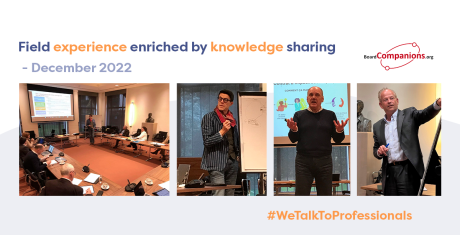Set the goal of challenging auditors to better understand their work and improve the overall quality of their certification. This is one of the roles of the audit committee as outlined by the Financial Reporting Council (UK) in a January 2022 study.
This study, which gives the floor to a wide range of Audit Committee Chairs, is particularly interesting because it is qualitative. Let us focus on one of the chapters: Challenging auditors and resolving conflicts. (See at the bottom of the article the link to the study).
During the process, Audit Committee Chairs are expected to build rapport with the auditors but also challenge judgements and findings, without creating excessive conflict. It is important that the relationship is not too comfortable and that both auditors and Audit Committee Chairs are skeptical when needed and ask the hard questions. As well as challenging judgements, Audit Committees oversee the entire audit process to ensure it is effective and robust.
Auditors must be skeptical; they have to challenge; they have to ask questions. And in my view as an Audit Committee Chair, if the relationship with the auditors and the management is too comfortable then it is not going to work. There has to be a bit of friction.
I am always challenging; I am always asking the questions. I think that is your role as Audit Chair and anybody on the Audit Committee … So, yes, continually challenge, continually ask those questions, make sure people think that you really are watching them, because we are, and we should be. Getting that balance is hard … You want to build a working relationship but never crossing the line in terms of that balance of challenge and independence and questioning.
Usually, with decent firms, you are talking about opinion and, ‘Wouldn’t it be better to do it this way?’, particularly, when you are talking about disclosures. You will debate those and, you know, you can challenge them. In the end, they have got their job to do, which is to provide an independent opinion and they will do that in their audit report, and they have got a right to stick anything they like in the audit report. So, they have got a nuclear option if we challenge, they do not agree and we do not change the accounts, then they can report it in their audit report. So, there tends to be something of a negotiation, where you then come to what is, hopefully, a sensible outcome.
‘Challenge’ most frequently occurred during the planning stage when discussing the audit scope, as well as during the first half of the audit, with the aim of there being less of a need, if at all, to challenge in the second half of the audit, to ensure a timely audit reporting process. Some Audit Committee Chairs spoke of drawing on their own expertise, including sector experience and business knowledge, as well as any previous experience of audits, to challenge the audit team, especially if they were a new team or firm.
We debate the key accounting judgements at some length, and then we check the reasoning. Do we think what the auditors might have told us was reasonable? Do we think they went deep enough? Did they do enough sample testing? Is their materiality an acceptable one for us? In the planning stage, I would want to see the plan to make sure that the plan covers everything I can envisage. Then what I like to do is I like to go with the auditors to the site visit because then I can see how diligent they are in looking at the site.
Audit Committee Chairs reported challenging auditors with management present but also when they were not. By meeting without management present, some Audit Committee Chairs reported that audit teams felt more comfortable to raise concerns and confusions. Many Audit Committee Chairs spoke of wanting to prevent, predict and resolve issues before Audit Committee Meetings.
I normally try and have the conversation first with the audit partner outside of the Audit Committee and try and unpick it and give him a chance to explain where he or she is coming from, and then challenge it within the Audit Committee and seek the views of others within the Audit Committee, and then indeed within the main board.
I would then have a debrief call or a meeting at the end of the site visit once they have had their first results and we would discuss the high-risk areas, the areas where we are going to anticipate dispute with the management because the management sees it differently.
We would have a chat, before every Audit Committee meeting, to find out whether there are any issues that worry him, or whether there are things where he is not getting the cooperation that he should, or the firm is not getting the cooperation that they should.
The complicated conflicts are where it is a judgement, and then my role is mainly to be that of a mediator so that both come away with a result which they can live with. So, when it gets emotional, you try to take the emotion out. You try to go back to basics, but it is basically what you do as mediator and if everything fails, then we will put it in front of the Audit Committee and discuss it in the Audit Committee and see whether we can find a solution, but most of the time it is solvable.
Many Audit Committee Chairs said they do have a role to play when there are disputes and conflict between company management and the auditors but hoped it would be solved without them needing to step in, in advance of the reporting stage to avoid delays in sign off.
There are certainly instances where we as an Audit Committee have taken a view that is different from the one that the auditor took. In doing that, we firstly have evaluated the consequences of that, because it generally impacts on adjusted differences. Made sure that we were comfortable we understood why we were doing it and made sure the minutes reflected the debate and the auditor’s view, because the auditor should be protected in that case.
I had a couple of meetings over the year end with both the audit partner and with management on a particular issue … Normally I would have expected the CFO and the audit department to resolve most of that and come to a conclusion, but because it was quite contentious and because it was a reversal of an existing opinion that we had been given, it became quite a challenging environment, so I needed to get involved. Obviously, the quality of the external audit is my responsibility, so I need to make sure we are making the right accounting decisions.
Full survey : https://bit.ly/Audit-Committee-Chairs-Research




